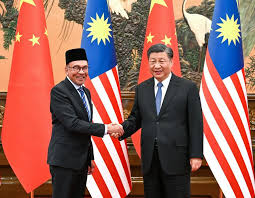China’s leadership in AI shaping global innovation & cooperation: international AI leaders

China Economic Net
Beijing: China’s rapid advancements in artificial intelligence (AI) are positioning the nation as a global powerhouse in technological innovation, playing a pivotal role in international collaboration and governance.
Dr. Sean Heigeartaig, Director of the AI: Futures and Responsibility Programme, University of Cambridge told China Economic Net at the World Internet Conference Wuzhen Summit in China.
Themed Embracing a People-centered and AI-for-good Digital Future — Building a Community with a Shared Future in Cyberspace, the summit features a dazzling Light of Internet Expo that demonstrates cutting-edge digital solutions and 24 sub-forums that attract the participation of over a thousand guests from over 130 countries.
AI takes center stage during the summit. From humanoid robots, eVOTLs, and unmanned tour buses, to AI-empowered medical therapy, lively demonstrations of AI applications highlight the opportunities China brings to the global AI landscape.
According to the China Internet Development Report 2024 released yesterday at the World Internet Conference, the number of effective artificial intelligence invention patents in China reached 378,000 by the end of 2023, a year-on-year growth rate of more than 40%, 1.4 times the global average growth rate. In the past several years, nearly ten thousand digital plants and smart factories have been built throughout the country.
“China has cemented its position as a leader in AI, with innovations seamlessly integrated into daily life and industries. From improving business operations to addressing critical global issues such as poverty, climate change, and sustainable development, China’s AI ecosystem demonstrates its ability to deliver solutions beyond commercial priorities,” Dr. Sean Heigeartaig observed, noting that China’s rapid innovation provides ideas for how AI can benefit people globally.
John Hoffman, CEO of Global System for Mobile communications (GSMA) told CEN that in China, AI, together with 5G and big data, allows great opportunities especially for the enterprise sector.
“Chinese enterprises has put into operation the world’s largest terrestrial augmentation base station network, built China’s first large-scale regional digital road, and the country’s first cross-regional MEC and C-V2X fusion test bed… The size and scale that we’ve seen here in China is unprecedented,” he said.
Statistics from China’s national data bureau show that generative artificial intelligence applications have witnessed vigorous development. As of March this year, the number of large-scale artificial intelligence models in China with over 1 billion parameters each has exceeded 100, empowering an assortment of industries from education, healthcare, finance, and energy, etc. Between 2014 and 2023, China produced more than 38,000 generative AI inventions, ranking first globally.
At the World Internet Conference, an Artificial Intelligence Professional Committee was established, with 173 AI experts from the globe as the first batch of members, marking a step forward in global AI cooperation and governance.
“There can be no meaningful global AI governance without China. China’s engagement in global AI governance has been widely recognized as essential. It has actively participated in legislative efforts, and has contributed to discussions at the United Nations,” remarked Dr. Sean Heigeartaig, stressing that collaboration is crucial, particularly as countries navigate differences in data privacy, risk management, and economic priorities. Recognizing these differences while fostering interoperability is key to creating effective governance frameworks.
Digital divides—both within and between nations—pose a significant challenge to global AI governance. Addressing disparities in access to AI technology, especially in rural areas and developing countries, is essential for achieving global equity.
While geopolitical tensions and intellectual property concerns present hurdles, there’s an urgent need for China, Europe, and global countries to prioritize collaboration on AI against shared challenges, such as food security and environmental protection,” said Patrick Nijs, co-founder of Europe China Joint Innovation Center.





